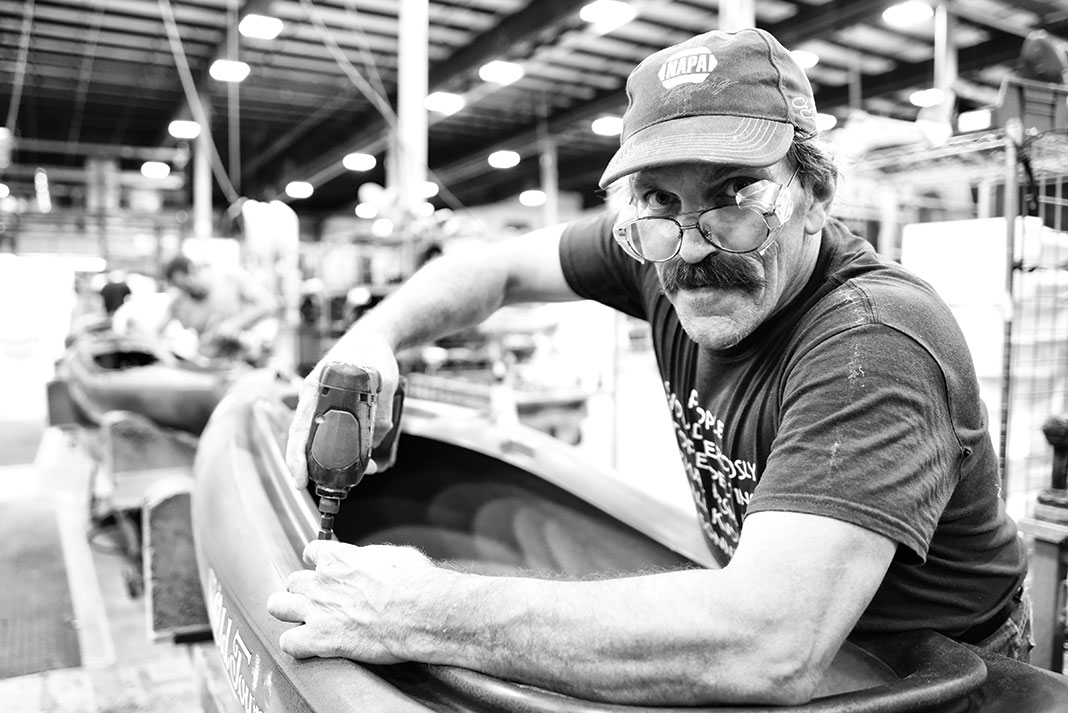
Remember back before Covid turned the paddlesports world on its head, when the biggest thing many retailers and manufacturers had to worry about was an old-fashioned trade war? Covid may finally be coming under control, but the tariff battles are still raging. In fact, the so-called Trump tariffs are still in place two and a half years after their namesake’s reluctant exit from the Oval Office.
No truce in the trade war
The tariffs could be with us for years more to come, thanks to forces great and small in American politics, from the powerful labor interests at the foundation of President Joe Biden’s constituency all the way down to Vermont Senator Patrick Leahy’s bum hip.
More on that in a moment, but first, let’s review.
Back in 2018, the Trump administration levied new tariffs on steel and aluminum—including imports from most-favored besties Canada and the EU. The snubbed trading partners answered with retaliatory duties on U.S.-made canoes and kayaks, and thousands of other goods. The Europeans slapped a 25 percent tariff on U.S. paddlecraft, and the Canadians put a 10 percent tax on northbound kayaks and canoes.
U.S. takes aim at Chinese imports
While the transatlantic squabble impacted the European sales of U.S. manufacturers such as Wenonah and Jackson, it was a mere sideshow to the trade war with China, which Trump kicked off in 2018 and 2019 with tariffs on some $370 billion in Chinese imports. Among them were duties on standup paddleboards, kayaks, pedal drives and all manner of raw materials.
The import duty on inflatable kayaks from China increased from 2.4 percent to 27.4 percent overnight, says Sea Eagle CEO John Hoge. The tariffs were a body blow to his business, but to add insult to injury, they made no sense. Tariffs are supposed to protect domestic industry by slowing competition from abroad, but Hoge says no one in the United States makes inflatable kayaks anything like those Sea Eagle imports from Asia.
Hoge took his case to the Office of the United States Trade Representative in 2019, requesting tariff exclusions for inexpensive inflatable kayaks and entry-level paddles from China. It worked.
“We got a refund on everything we had paid before the exemption was put into place, and for one year from the date of the exemption, everything we brought in from China was tariff-free,” he says. However, not all paddlesports imports received exclusions. Products such as hard-shell kayaks and canoes competing with U.S.-made boats don’t meet the requirements for tariff relief.
Also, the loophole was temporary. When the exclusions expired in August 2020 the Trump administration didn’t renew them, but by then the Covid paddling boom was in full swing and not even a 27.4 percent surcharge could dampen buyers’ enthusiasm.
“All the inflatable companies are paying the full tariff again, but in the environment where people had more money than ever and they were chasing goods, it wasn’t a problem,” Hoge says.
Squinting to see relief on the horizon
Now with the market coasting toward a new post-Covid normal, the tariff issue is again front of mind. Democrats had railed against the Trump trade war for years, but when President Biden took office he kept them in place. His blue-collar blue-state coalition has close ties to organized labor, and the unions have made clear they want no concessions on the trade war’s central fronts. Steel and aluminum, automobiles, aircraft, heavy equipment, washing machines—those are all off the table.
What is on the table? Duties on consumer goods like bicycles, according to press accounts citing administration sources. That could be good news for some paddlesports segments—surely a kayak pedal drive is like a bicycle?—though the odds for any product gaining relief seem rather long. Biden floated the idea of lifting about $10 billion of the $370 billion in tariffs his predecessor imposed, but that was way back in July. By August, the trial balloon was running short on helium.
Democrats railed against Trump’s trade war for two years, but when President Biden took office, he left them in place.
Biden stayed mum on the subject all summer, apparently waiting for the U.S. Congress to make the issue go away. For more than a year, competing bills had been marching through the House and Senate to make the U.S. semiconductor industry more competitive with China, among many other things.
These were the kind of bipartisan must-pass bills that collect all kinds of legislative passengers. One rider in the Senate version would have reinstated all the tariff exclusions in place during the Trump administration, including those on inflatable kayaks and aluminum-shafted paddles. The House bill had no such provision.
For most of the summer the bills were in reconciliation, a process in which 107 Senators and Representatives decided what baggage the combined bill would carry across the finish line, and what would be thrown overboard.
Along the way the combined bill collected a new name, the CHIPS for America Act, as well as $52 billion in support for the domestic semiconductor industry and a further $228 billion for other stuff—but no tariff relief. Lawmakers jettisoned the provision just days before the bill passed with bipartisan support.
For now at least, there will be no truce in the trade war.
In theory tariffs are designed to protect American manufacturing jobs, like those on the Old Town kayak assembly line. | Feature photo: Courtesy Old Town